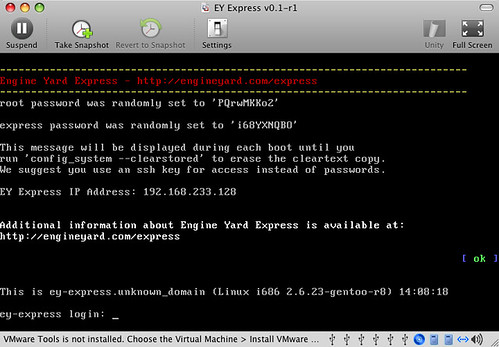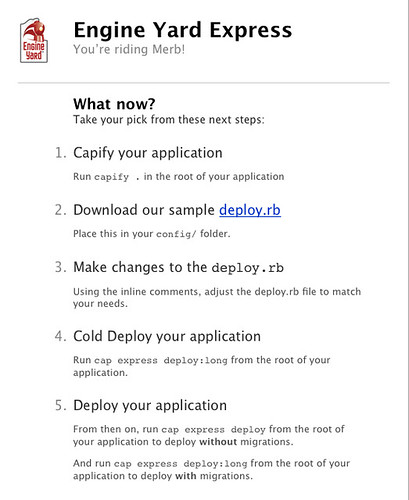Engine Yard Express: A Production Slice on Your MacBook Pro
2008-06-20
While computing moves more and more to the cloud, it’s interesting that Ruby web development best practices tend to go in the opposite direction, toward the workstation right in front of you. Running a local web server via ‘script/server’ (or my preferred method of ‘thin start’), hosting gem documentation locally, and using local git branches are all win/win practices because they’re far more efficient, and frankly, let you do some bonehead moves without your co-workers ever having to know.
So maybe deployments should be practiced locally as well. Ezra Z. has announced Engine Yard Express, a VMware image that’s essentially an Engine Yard production slice. The idea is that you run the image via virtualization software on your workstation, so that you can get all the benefits of a virtual server without having to actually connect to one through the Tubes.
Yes, this really rocks. You’ll be able practice deployments on the plane!
So first, you’ll need to buy VMware Fusion for your Mac. I first purchased Parallels over a year ago, but VMware clearly kicks its ass. Clearly. It actually runs Windows without making the rest of your system unusable.
Next, download the image and double-click on it. Before you even realize what happened, you’ll be presented with a ready, fully-functional slice just waiting for you like an obedient dog:
You’ve been pleasantly provided with randomly generated passwords for the root and express users, and you’re even given the IP address it’s chosen.
Let’s create an alias for that address so we don’t have to memorize it. Open up /etc/hosts in your favorite text editor (requires sudo permission) and stick something like this in there:
192.168.233.128 express.local
Now, you should probably just leave your VMware window alone. Instead you’ll want to SSH into the slice as if you were logging into a remote server:
$ ssh express@express.local
Nice! A quick visit to http://express.local:81 gives you your Merb start page.
Now, in your Capistrano scripts, you can use ‘express.local’ as the domain of your servers, and you’ll be able to practice deployments without ever connecting to a remote server. Bom chicka wa waa!
blog comments powered by Disqus
